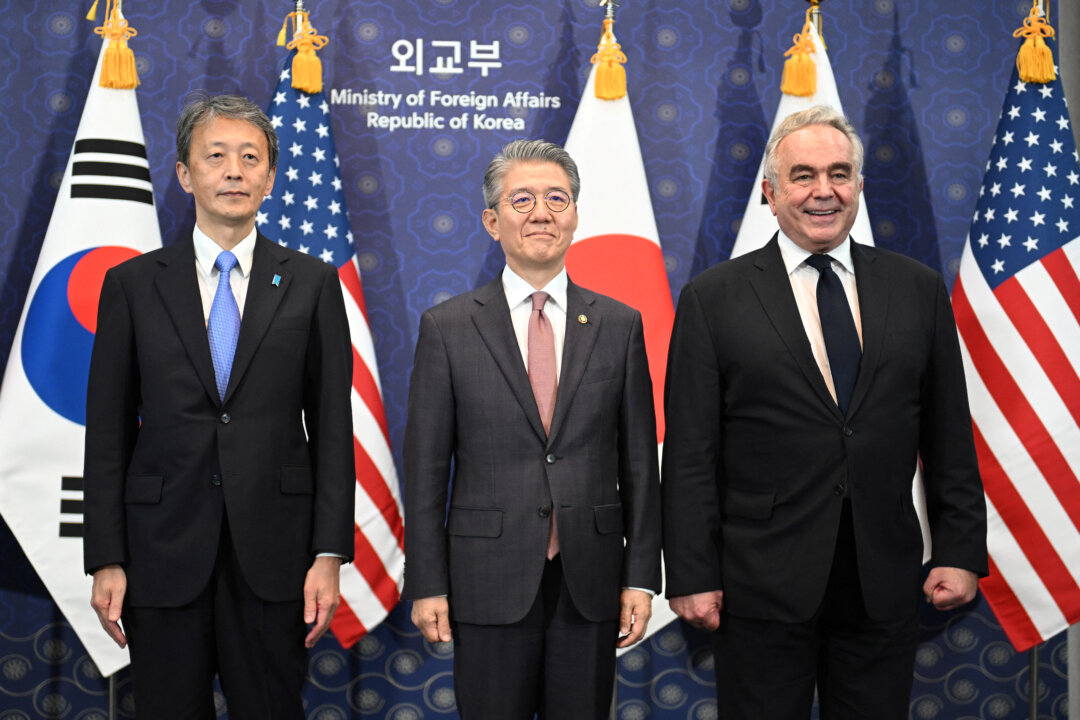The multilateral team will continue the work of a disbanded U.N. panel of experts who were responsible for monitoring the enforcement of the sanctions.
The United States, Japan, South Korea, and eight other countries launched a new mechanism on Oct. 16 to monitor the enforcement of sanctions against North Korea.
The Multilateral Sanctions Monitoring Team (MSMT) was established to replace a U.N. monitoring team that was disbanded in April after Russia vetoed the renewal of its mandate, according to South Korean First Vice Foreign Minister Kim Hong Kyun.
China abstained from the U.N. vote at the time.
Kim launched the MSMT in Seoul, South Korea, at a joint press conference with U.S. Deputy Secretary of State Kurt Campbell, Japanese Vice Minister for Foreign Affairs Masataka Okano, and the ambassadors of Australia, Canada, France, Germany, Italy, the Netherlands, New Zealand, and the UK.
In a joint statement, the allies reaffirmed their commitment to fully implement U.N. sanctions against North Korea. The statement also said that Japan, as a member of the U.N. Security Council, will work more closely with allies including the United States and South Korea and continue active discussions with North Korea.
Speaking of the urgency to replace the now-defunct U.N. regime to monitor sanctions, Kim said North Korea’s violations of sanctions continue to occur.
“So we thought that we should not delay any longer and should quickly fill the gap,” he said.
He noted that the MSMT is open to all countries that are willing to help ensure the implementation of sanctions, while the allies also continue the effort to reinstate the U.N. scheme.
Campbell told the conference that Russia’s veto was likely influenced by its illegal procurement of military equipment and munitions from North Korea for its war in Ukraine, as noted by the U.N. panel’s previous reporting.
Speaking of the MSMT, Campbell said, “The potential for this to be a major effort in tracking and holding to account steps that North Korea is taking across a range of provocative actions is real, and we look forward to it taking shape in the months and years ahead.”
Besides providing weapons, North Korea has also been accused recently of sending personnel to support Russia’s war against Ukraine.
Speaking to his Parliament on Oct. 16, Ukrainian President Volodymyr Zelenskyy said the North Korean personnel included factory workers as well as soldiers.
“In fact, this is the participation of a second state in the war against Ukraine on the side of Russia,” he said.
Commenting on the accusation on Oct. 15, White House National Security Council spokesperson Sean Savett said that if North Korea did send troops to Ukraine, it would mark a significant increase in the North Korea–Russia defense relationship and “indicate a new level of desperation for Russia as it continues to suffer significant casualties.”
Kremlin spokesman Dmitry Peskov previously dismissed the allegation that North Korean troops have been fighting for Russia against Ukraine, calling it “fake news.” Moscow and Pyongyang have denied arms transfers but have stated that they would boost military ties, possibly including joint drills.
Asked in Seoul about the accusations, Campbell said there have been signs of enhanced material support to Russia from North Korea, including artillery shells and missiles, and that the United States is still evaluating reports about the involvement of North Korean personnel in the war.
At the press conference, the allied nations also condemned North Korea for escalating tensions with its southern neighbor.
“We have strongly condemned North Korea for its continued nuclear and missile threats, for blowing up the inter-Korean roads and railways, for blocking the border of the southern side of border, and for claiming that South Korea has sent a drone to infiltrate North Korea while increasing the tension between the two countries,” Kim said.
According to South Korea’s Joint Chiefs of Staff, North Korea blew up parts of roads and railways connecting the two countries that are within its own borders.
The explosions occurred after Pyongyang accused South Korea of sending drones carrying propaganda leaflets across the border, and announced on Oct. 9 that it would cut off roads and railways between North and South Korea to fortify the areas with “defense structures.”
Reuters contributed to this report.

